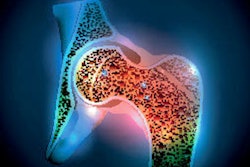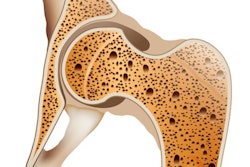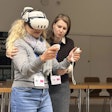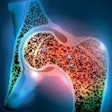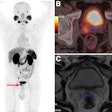
Individuals with low bone mineral density (BMD) scores on dual-energy x-ray absorptiometry (DEXA) may be more likely over time to develop dementia, according to a study published online on 22 March in Neurology.
Epidemiologists at Erasmus MC in Rotterdam, the Netherlands, found participants with low BMD scores at the beginning of a clinical trial were more likely to develop dementia over a long follow-up period -- yet they noted the finding warrants further studies.
"Participants with low femoral neck and total body bone mineral density and low trabecular bone score were more likely to develop dementia. Further studies should focus on the predictive ability of bone mineral density for dementia," wrote lead author Tian Xiao, PhD.
Low BMD and dementia commonly occur simultaneously in the elderly, with bone loss accelerating in dementia patients due to physical inactivity and poor nutrition, the authors explained. However, uncertainty persists over the extent to which bone loss already exists prior to the onset of dementia. Thus, the researchers investigated how dementia risk was affected by BMD at various skeletal regions in older adults.
The group acquired BMD scores for the femoral neck, lumbar spine, total body, and trabecular bone using DEXA scans in 3,651 participants free from dementia between 2002 and 2005; individuals at risk of dementia were tracked until January 2020. The investigators assessed any associations between BMD at baseline and the risk of dementia over time.
Among the patient cohort, 688 (18.8%) developed incident dementia over a median of 11.1 years and 528 (76.7%) developed Alzheimer's disease.
Xiao and colleagues found that during the follow-up period, participants with lower BMD at the femoral neck were more likely to develop all-cause dementia (hazard ratio, 1.12; with 1 as reference) and Alzheimer's disease (hazard ratio, 1.14). The risk of dementia was greatest for groups with the lowest BMD within the first 10 years of the research effort.
"Participants with low bone mineral density at the femoral neck had an increased risk of dementia in both the current study and previous prospective studies," the authors noted.
The study confirms previous research that showed how associations between BMD and dementia change with time, with the strength of the effect decreasing with increasing follow-up, the researchers wrote. They noted that their work suggests that total bone mineral density and trabecular bone score might occur as prodromal features instead of causes of dementia and related toxic protein accumulation in the brain, they wrote.
"In other words, persons with subclinical, incipient dementia may have poor bone health due to the dementia process instead of vice versa," the authors concluded.




